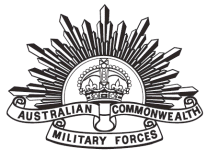
| Regimental number | 2304 |
| Place of birth | Melbourne, Victoria |
| Occupation | Clerk |
| Address | 27 Crimea Street, St Kilda, Victoria |
| Marital status | Single |
| Age at embarkation | 29 |
| Height | 5' 10.25" |
| Weight | 168 lbs |
| Next of kin | Father, L Fryberg, 27 Crimea Street, St Kilda, Victoria |
| Previous military service | Served for 2 years 35 days in the Royal Fusiliers, British Army; discharged by purchase. |
| Enlistment date | |
| Date of enlistment from Nominal Roll | |
| Place of enlistment | Melbourne, Victoria |
| Rank on enlistment | Private |
| Unit name | 6th Battalion, 6th Reinforcement |
| AWM Embarkation Roll number | 23/23/2 |
| Embarkation details | Unit embarked from Melbourne, Victoria, on board HMAT A62 Wandilla on |
| Rank from Nominal Roll | Private |
| Unit from Nominal Roll | 6th Battalion |
| Fate | Returned to Australia |
| Discharge date | |
| Other details |
War service: Egypt, Gallipoli Joined 6th Bn, Gallipoli, 6 August 1915.Admitted to No 2 Field Ambulance, 17 September 1915 (piles); transferred same day to No 3 General Hospital; rejoined unit from Base, 24 September 1915. Admitted to No 2 Field Ambulance, 23 October 1915 (influenza), and transferred same day to 1st Canadian Stationary Hospital; discharged to Base Details, 6 November 1915; rejoined Bn, 7 November 1915. Admitted to Bentinck Home, Cairo, 22 December 1915 (haemorrhoids); transferred to Overseas Base, 22 December 1915. Transferred to, and discharged from, under escort, Ras el Tin Convalescent Home, 13 January 1916. Admitted to No 1 Australian General Hospital, Cairo, 22 January 1916 (haemorrhoids); discharged to Overseas Base to duty, 5 February 1916. Medical Officer noted: 'Pte Fryburg (sic) was at Ras-el-Tin C.C. complaining of "Malaria". He appeared to have no definite malaria while there. He left under escort as he as waiting Court-Martial. He was a little neurotic but I consider him mentally sound and his memory was quite good.' Field General Court Martial convened, 28 January 1916, on charge of when on Active Service conduct to the prejudice of good order and Military discipline, in that he, at Ras el Tin Convalescent Camp, Alexandria, on January 8th 1916 represented himself to be a First Class Warrant Officer, well knowing that he was a private soldier, but could not be held because the accused was in hospital. Admitted to No 1 Australian General Hospital, Cairo, 14 February 1916 (mental condition serious). Medical report, 29 February 1916: 'Admitted from Military Police Barracks 14/2/16 to 1st A.G.H. in a dazed stuporose state. Had been awaiting a court martial. Would not speak. Looked from one to the other in a dazed and startled way or else curled himslf up in bed and would take no notice of anyone. Apparently did not understand what was said to him but on the first evening he was troublesome about taking his food and when the sister threatened to send for me to use the stomach pump, he, within a few minutes took his tea and ever since has sat up and eaten it without trouble. His pupils were widely dilated at first and he had a certain tremour on one side of the mouth. He gradually got less stuporose but did not take any notice when spoken to. On 22/2/16 he suddenly became normal and could read English and Hebrew. Appreciated everything around him but declared he has lost his memory. In my opinion the stuperose condition was genuine resulting from brooding over his trial, and that his loss of memory is not genuine. When questioned as to his loss of memory his many answers are so deliberative and studied and lacking in spontaneity, and his general demeanour, he is so little concerned about his lapse that I do not think the loss of memory is genuine. Yet his general demeanour and previous behaviour shows him to be mentally unreliable for military duties.' Assistant Registrar, 1st Australian General Hospital, 13 March 1916, noted: 'During his stay in hospital his mental condition was normal in every way save that he was harbouring a grievance, stating that being really Warrant Officer, he had been unjustly reduced to the ranks.' Transferred to No 2 Auxiliary Hospital, 3 March 1916 (loss of memory); transferred to Mental Hospital, 14 March 1916. Commenced return to Australia from Suez on board HMAT 'Demosthenes' (mental deficiency); arrived Melbourne, 19 April 1916; discharged (medically unfit), Melbourne, 24 May 1916. Medals: 1914-15 Star, British War Medal, Victory Medal |
| Sources | NAA: B2455, FRYBERG Horace Hyman |